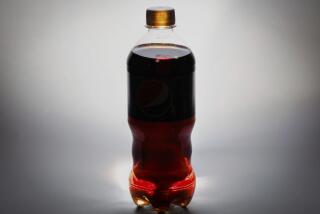Global Health Panel Expresses Concerns on Fried Food Risks
- Share via
A panel of health experts hastily convened by the World Health Organization said Thursday that they have “major” concerns that a chemical caused by cooking starchy foods such as French fries and potato chips at high temperature could pose a cancer risk to humans.
The panel, which met in Geneva after the release of a Swedish government study identifying the suspected human carcinogen in a variety of foods, said it was disturbed by the high levels of acrylamide in many of the 200 food products tested.
“After reviewing all the available data, we have concluded that the new findings constitute a serious problem,” said Dr. Dieter Arnold, chairman of the WHO meeting.
The panel noted that, while the substance is known to cause cancer in animals, little is known about its effect on humans. Therefore, it did not issue warnings to consumers against eating certain foods, urging instead a balanced and varied diet, rich in fruits and vegetables.
More research is needed, the group said, to establish whether the agent causes cancer in humans and to pinpoint how it is formed during cooking.
Acrylamide is used to treat water, make plastic packaging and is a component of cigarette smoke.
The U.S. Food and Drug Administration, which sent representatives to the meeting, said in a statement Thursday that it will widen the range of foods it is testing for acrylamide and will do additional research to gauge its effect on human health.
Many U.S. scientists said there is no immediate cause for alarm. Much of the foods we eat every day contain some level of animal carcinogens and pose no threat to humans, said Dr. Elizabeth Whelan, president of the American Council on Science and Health.
Smoking, which accounts for a third of all cancer cases, is a much bigger risk, she said, as would be a diet deficient in fruits and vegetables. “It’s a puzzle to us, why [acrylamide] is being singled out.” Whelan said.
However, analysts say there are some differences between the acrylamide stir and other food scares of the past, such as those involving the apple growth-regulator Alar and the artificial sweetener saccharine.
The levels of acrylamide detected in food are significantly higher than the dose shown to cause tumors in rats. One test of McDonald’s French fries found levels of acrylamide 300 times more than the amount allowed by the U.S. Environmental Protection Agency in a glass of water.
“The bigger exposure estimates makes acrylamide look like it needs further research,” said Lois Swirsky Gold, who directs the cancer potency project at UC Berkeley.
The Swedish findings, released in April, initially were dismissed by some public health experts who questioned the study’s methodology and its limited scope; the study tested only 100 food products.
Since then, further research in Britain and Norway has backed up the Swedish study’s results and more products have been analyzed. Recent tests by the Center for Science in the Public Interest, a U.S. consumer group, found similarly high levels in a dozen products it tested, including cereals, taco shells, potato chips and French fries.
But there’s a lot that still isn’t known about the chemical. The amount of acrylamide in products varies widely, even among similar foods. Fritos brand corn chips, for instance, contained more than three times the amount of acrylamide as Tostitos, according to the center’s study.
United Nations officials said they intend to create a global network to share research on acrylamide with different government agencies.
“Clearly we need more research in this area,” said Jorgen Schlundt, head of the WHO food safety program.





